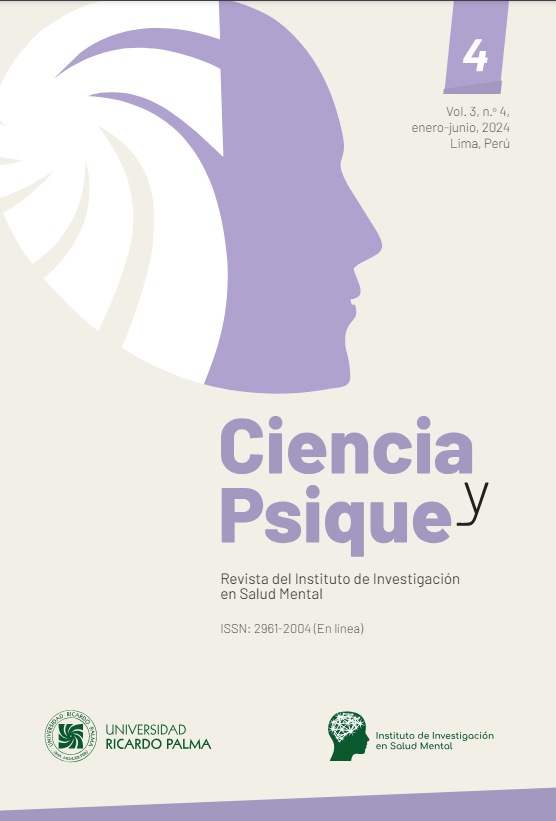The bereavement process: A theoretical review under the foundations of Acceptance and Commitment Therapy (ACT)
DOI:
https://doi.org/10.59885/cienciaypsique.2024.v3n4.06Keywords:
grief, acceptance and commitment therapy, experiential avoidance, theoretical reviewAbstract
The phenomenon of bereavement has been characterised as having a primarily cognitive conceptualisation. It has been identified that these interventions often generate negative consequences that further harm the clients. From the framework of Acceptance and Commitment Therapy (ACT), we explain why this happens and provide an intervention proposal based on learning principles, which are called experiential avoidance and orientation towards personal values, in order to obtain more convenient procedures for the well-being of the individual. Therefore, through ACT, the aim is to establish a change based on acceptance and decision making based on valuable aspects of the patient’s life, so that he or she is more willing to face difficult events.
References
Barraca, J. (2007). La terapia de Aceptación y Compromiso (ACT). Fundamentos, aplicación en el contexto clínico y áreas de desarrollo. Miscelánea Comillas, 65(127), 761-781. http://jorgebarraca.com/wp-content/uploads/Terapia-de-Aceptacion-y-Compromiso-ACT. pdf
Bayés, R. (1998). Psicología del sufrimiento y de la muerte. Anuario de Psicología, 29(4), 5-17. https://www.raco.cat/index.php/AnuarioPsicologia/article/download/61497/88344
Benítez, E. (2017). Características resilientes y maladaptativas en el proceso de duelo por suicidio en las familias. Revista REDES, 36, 2(1), 58-68. http://redesdigital.com.mx/index.php/redes/article/view/211
Campos, A. (2017). Aplicación de la Terapia de Aceptación y Compromiso (ACT) al duelo [Tesis de pregrado]. Universidad de Jaén. http://tauja.ujaen.es/bitstream/10953.1/5891/1/Campos_Pedrosa_Ana_TFG_Psicologa.pdf
Carrascoso, F., & Valdivia, M. (2009). Terapia de Aceptación y Compromiso (ACT) en el Tratamiento del Desorden de Pánico: Algunas consideraciones de la Investigación sobre Procesos Básicos. International Journal of Psychology and Psychological Therapy, 9(3), 299-315. https://www.researchgate.net/publication/322699109_ACT-Aplicaciones
Clark, D., & Beck, A. (2010) Terapia cognitiva para la ansiedad. Ciencia y práctica. Desclée de Brouwer.
Cruz, J., Reyes, M., & Corona, Z. (2017). Duelo: tratamiento basado en la Terapia de Aceptación y Compromiso. Manual Moderno.
Davis, E. L., Deane, F. P., Lyons, G. C., Barclay, G. D., Bourne, J., & Connolly, V. (2020). Feasibility randomised controlled trial of a self-help acceptance and commitment therapy intervention for grief and psychological distress in carers of palliative care patients. Journal of Health Psychology, 25(3), 322-339. https://doi.org/10.1177/1359105317715091
Echeburúa, E., Corral, P., & Amor, P. (2005). La resistencia humana ante los traumas y el duelo. En W. Astudillo, A. Casado, & C. Mendinueta (Eds.), Alivio de las situaciones difíciles y del sufrimiento en la terminalidad. Sociedad Vasca de Cuidados Paliativos. https://paliativossinfronteras.org/wp-content/uploads/libroAlivio.pdf
Estévez, A., Ramos, J., & Salguero, J. (2015). Tratamiento transdiagnóstico de los desórdenes emocionales. Síntesis.
Falagán, N. (2014). El duelo: Diagnóstico y abordaje del duelo normal y complicado. [Tesis doctoral]. Universidad de Cantabria. https://repositorio.unican.es/xmlui/handle/10902/8298
Hardt, M. M., Williams, J. L., & Jobe‐Shields, L. (2022). The role of experiential avoidance in the relationship between traumatic distress and yearning in sudden and unexpected bereavement. Journal of Clinical Psychology, 78(4), 559-569. https://doi.org/10.1002/jclp.23233
Hayes, S. (2016). The ACT in context. The canonical papers of Steven C. Hayes. Routledge.
Hayes, S., Strosahl, K., & Wilson, K. (2003) Acceptance and commitment therapy. An experiential approach to behavior change. The Guilford Press.
Infosalus. (10 de octubre de 2022). El duelo patológico, en aumento por las muertes inesperadas del COVID-19. https://www.infosalus.com/asistencia/noticia-duelo-patologico-aumento-muertes-inesperadascovid-19-20201030104651.html
Jones, K., Methley, A., Boyle, G., Garcia, R., & Vseteckova, J. (2021). A Systematic Review of the Effectiveness of Acceptance and Commitment Therapy for Managing Grief Experienced by Bereaved Spouses or Partners of Adults Who Had Received Palliative Care. Illness, Crisis & Loss, 30(4), 596-613. https://doi.org/10.1177/10541373211000175
Luciano, M., & Cabello, F. (2001). Trastorno de duelo y Terapia de Aceptación y Compromiso. Análisis y Modificación de Conducta, 27(113), 399-424. https://www.researchgate.net/publication/39148555_Trastorno_de_duelo_y_terapia_de_ aceptacion_y_compromiso_ACT
Luciano, M., & Valdivia, M. (2006). La terapia de aceptación y compromiso (ACT). Fundamentos, características y evidencia. Papeles del Psicólogo, 27(1), 79-91. https://www.redalyc.org/pdf/778/77827203.pdf
Medina, D. (2020). Efecto de la Terapia de Aceptación y Compromiso en el duelo por ruptura de pareja. [Tesis magistral]. Fundación Universitaria Konrad Lorenz. https://repositorio.konradlorenz.edu.co/handle/001/2283
Morina N. (2011). Rumination and avoidance as predictors of prolonged grief, depression, and posttraumatic stress in female widowed survivors of war. The Journal of nervous and mental disease, 199(12), 921–927. https://doi.org/10.1097/NMD.0b013e3182392aae
Najjari, F., Khodabakhshi Koolaee, A., & Falsafinejad, M. R. (2017). The effectiveness of group therapy based on Acceptance and Commitment (ACT) on loneliness and psychological adjustment in women after divorce. Journal of Torbat Heydariyeh University of Medical Sciences, 5(3), 68-75. http://jms.thums.ac.ir/article-1-459-en.htm
Nam, I. (2016). Suicide bereavement and complicated grief: experiential avoidance as a mediating mechanism. Journal of loss and trauma, 21(4), 325-334. https://doi.org/10.1080/15325024.2015.1067099
Parro, E., Morán, N,. Gesteria, C., Sanz, J., & García, M. (2021) Duelo complicado: Una revisión sistemática de la prevalencia, diagnóstico, factores de riesgo y de protección en población adulta de España. Anales de Psicología, 37(2), 189-201. https://revistas.um.es/analesps/article/view/443271
Rachlin, H. (1991) Aprendizaje y comportamiento. Omega.
Ruiz, A., Díaz, M., & Villalobos, A. (2012). Manual de Técnicas de Intervención Cognitivo Conductuales. Desclée de Brouwer.
Trigos, M. (2021).Evitación experiencial en el proceso de duelo en sobrevivientes a pérdida por suicidio. [Tesis de Licenciatura]. Universidad Peruana de Ciencias Aplicadas. https://repositorioacademico.upc.edu.pe/bitstream/handle/10757/657628/TrigosN_M.pdf?sequence=3&isAllowed=y
Turrel, S., & Bell, M. (2016). ACT for adolescents. Treating teens and adolescents in individual and group therapy. Context Press.
Williams, J. L., Hardt, M. M., Henschel, A. V., & Eddinger, J. R. (2019). Experiential avoidance moderates the association between motivational sensitivity and prolonged grief but not posttraumatic stress symptoms. Psychiatry research, 273, 336–342. https://doi.org/10.1016/j.psychres.2019.01.020
Wilson, K., & Luciano, C. (2002). Terapia de aceptación y compromiso (ACT) Un tratamiento conductual orientado a los valores. Pirámide.
Downloads
Published
How to Cite
Issue
Section
License
Copyright (c) 2024 Ciencia y Psique

This work is licensed under a Creative Commons Attribution 4.0 International License.




